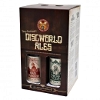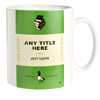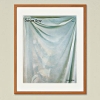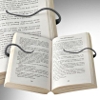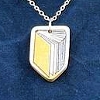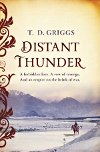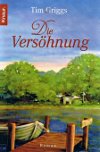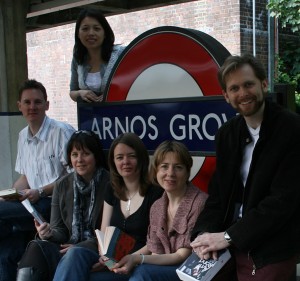
Books and music make brilliant bedfellows. Just think of Kate Bush twirling to ‘Wuthering Heights‘, Morrissey’s endless Wildean references and The Beatles proving there was more to them than love songs with ‘Paperback Writer‘.
South London band LiTTLe MaCHiNe continue the honourable rock-lit tradition. The three piece, made up of Chris Hardy, Walter Wray and Steve Halliwell, lit up our recent Aussie Christmas Party with a set of famous verse given a unique blues/folk/rock treatment.
Intrigued as to how the band came into being, and how they punk up Philip Larkin and balladise Byron, I pinned down guitarist Chris after the event.
Chris, thanks for such a great performance. How was it for you?
Great fun! Thanks for having us. That was our second North London Reading Group event and we hope you’ll have us back for more. Steve was disappointed at the level of cheating during the Aussie Lit. quiz(!) … but it was great to meet bookworms on the lash.
We really appreciate playing to an audience that knows and loves the poetry as much as we do. We try to tailor our act, (or at least the banter between songs) to suit our audience. We noticed that the NLRG audience laughed openly at a simile – Larkin’s, “Bonds and gestures pushed to one side like an outdated Combine Harvester”. We were impressed, and put it down to the Australian chardonnay.
So, who are LiTTLe MaCHiNe, and how did you all meet?
Steve and Walter have been in bands separately and together in the past, such as KING SWAMP (who you can find on YouTube). They have made records, toured in bands and as soloists. They are both musically educated – they can read and write music and understand musical theory. Steve is a multi-instrumentalist and poet, and Walter an accomplished finger-style, acoustic guitar player. They met a few years ago in Sainsbury’s in Streatham, after losing touch for ten years.
I am a poet and a folk-blues musician. I have played in blues & rock bands, and as a solo singer song-writer. I met Steve at the Barnes Stanza, (Stanzas are poetry groups set up all over the country under the auspices of the Poetry Society). The Stanza decided to give an evening performance, at the Poetry Cafe, where members would read their poems to whoever turned up. Steve suggested that he and Walter, (already called LiTTLe MACHiNe) play the settings of poems they had worked out. I then asked if I could play some of my songs and if Steve and Walter could back me – and I join them on LM’s material. We rehearsed, did the performance, and have kept going.
Where did the idea for turning poetry to music come from?
Steve says that, on a whim he decided to learn Yeats’s ‘The Lake Isle Of Inisfree‘ and, because the metre is so insistent, it pretty naturally fell into a tune as it rattled round his head. He recorded it and asked Walter to sing it.
Wal was then inspired to create a setting for ‘Ozymandias‘ which they produced together. After that there was no stopping them. What fun to take fabulous words and find their musical equivalents! I turned up with ideas for ‘Adam Lay Y’ Bounden’, and Blake’s ‘London‘. So then there were three of us ransacking the poetic canon.
How do you agree on which poems to tackle?
We each have our own way of doing this and there is no set procedure: I for example, usually have a few chords plus a tune and then stumble on the poem… this is how our setting of ‘The Love Song Of J. Alfred Prufrock’ began. When I brought this idea along to an LM session the other two developed it – adding chords, melody, and other parts of the arrangement we now have.
Walter turns up with highly wrought and difficult pieces fully formed and we (I) take a long time to master them, e.g. the sinister ‘Madam Life’s A Piece In Bloom’. Steve works like this too. They both find poems and then set them to music. With me it is the other way round.
How we select poems is a bit of a mystery but there is no plan or regular procedure. We know of many poems, and we have our favourite periods and authors. But it takes a long time to work out an arrangement, and longer for the group to agree on it and then learn it, so that is why our repertoire, while large enough for any performance, is nowhere near encompassing the poems available!
Is it obvious whether a poem deserves ballad or blues treatment?
Steve set Larkin’s ‘This Be The Verse‘ as a straight ahead rock and roll piece because of the poem’s period and content, and then he added ‘High Windows‘ in a ballad style, for the same reasons. Walter’s arrangement of ‘Ozymandias‘ has a sort of rolling menace that suits the poem (we think).
I have looked many times at Shakespeare’s famous lyric ‘Fear No More The Heat Of The Sun’ and suddenly realised that the regular beat of the, mainly trochaic ‘feet’, fitted the four-to-the-floor beat used in much rock music. The ‘feel’ of a driven set of chords also brings out something unexpected in what is usually thought to be a resigned, reflective piece of writing: Shakespeare also meant his poem to express anger at, and defiance of, death.
Steve believes the process is simply to keep what is right and ruthlessly discard what is wrong.
How difficult is it to get permission to turn poems to music? Has anybody refused?
You find out if the poem is still under copyright – I think anything older than 75 years old is free to use – for example Yeats’s ‘The Lake Isle Of Inisfree‘. We found though that, for example, William Carlos Williams’s poem ‘The Red Wheel Barrow‘, Dylan Thomas’s ‘Do Not Go Gentle Into That Good Night’, and the Larkin poems mentioned above, were all under copyright and we had to pay a fee to the author’s Estate, usually held by a publisher.
So a $20 bill got sent to New York for the Carlos Williams. Faber allowed us to set the Larkin poems, which means we can record and sell the recordings of these poems. But the Eliot Estate will not allow us to record our setting of Prufrock, they do not allow any of Eliot’s poems to be set to music they say – apart of course from Cats!
What are your musical and literary influences?
All the different types of blues players. 60’s & 70’s bands, some now almost forgotten. Folk poets – Dylan, Bert Jansch, the folk music of the Middle East and the Balkans, and Indian music too. As for poets, I will just mention some I really like: Plath, Larkin, Shakespeare, Raleigh, Shelley, Sassoon, the authors of the Greek Anthology, Eliot, Snyder, Lowell, and Carol-Ann Duffy, (she let us have performing and recording rights for her poem MEANTIME for nothing).
Steve’s influences are all sorts of poetry and about the last 80 years of popular music. If he had to pick a god from each he’d choose Emily Dickinson and Miles Davis, with Conrad’s ‘Heart of Darkness’ for prose. Maybe Shakespeare too (who he says is “not bad”.)
Walter cites his earliest influences as T.REX and David Bowie and, thanks to an inspirational A level English teacher, T.S. Eliot. He reckons ‘Earthly Powers’ by Anthony Burgess to be his favourite novel and is a big fan of Angela Carter.
What’s this about you performing the entire history of poetry in an hour?
EPIC! is meant to be a swift review of 3000 years of the British poetic tradition, (beginning as that does in ancient Greece) in one hour. It includes about 10 of our poem-songs along with a fantastic power-point show that includes relevant images and lyrics. Besides the songs there are recitations, for example from Chaucer and Milton, and connecting commentary including a few jokes.
The idea is to perform this in Colleges and 6th Forms, (and earn some money). So far we have found that it is enjoyed by 17 and 18 year olds but also by adults who like poetry.
EPIC is still being developed and is a framework for all sorts of content. We can perform it in any venue where we can put up a screen and a projector, along with our musical equipment. We intend our next CD to contain much of what we perform in EPIC and the recording, at Steve’s home studio, is going well.
When can people see you in action next?
We are performing EPIC later this month, at Dulwich College and finishing off the Much Wenlock Poetry Festival on April 15th. We go on after the three poet laureates, of England, Wales, and Scotland, have read, and we hope they and all the other well-known literary figures appearing at the Festival, (David Edgar, Daljit Nagra…) will be there to hear us .. and spread the word!
Listen to LiTTLe MaCHiNe at www.little-machine.com
 I was about or nine or ten, nearing the end of junior school and had chosen Shelley’s Frankenstein, among others, for my holiday reading – even then so much thought went into what to read while I had time off (I’m currently planning my reading for Christmas 2015).
I was about or nine or ten, nearing the end of junior school and had chosen Shelley’s Frankenstein, among others, for my holiday reading – even then so much thought went into what to read while I had time off (I’m currently planning my reading for Christmas 2015).